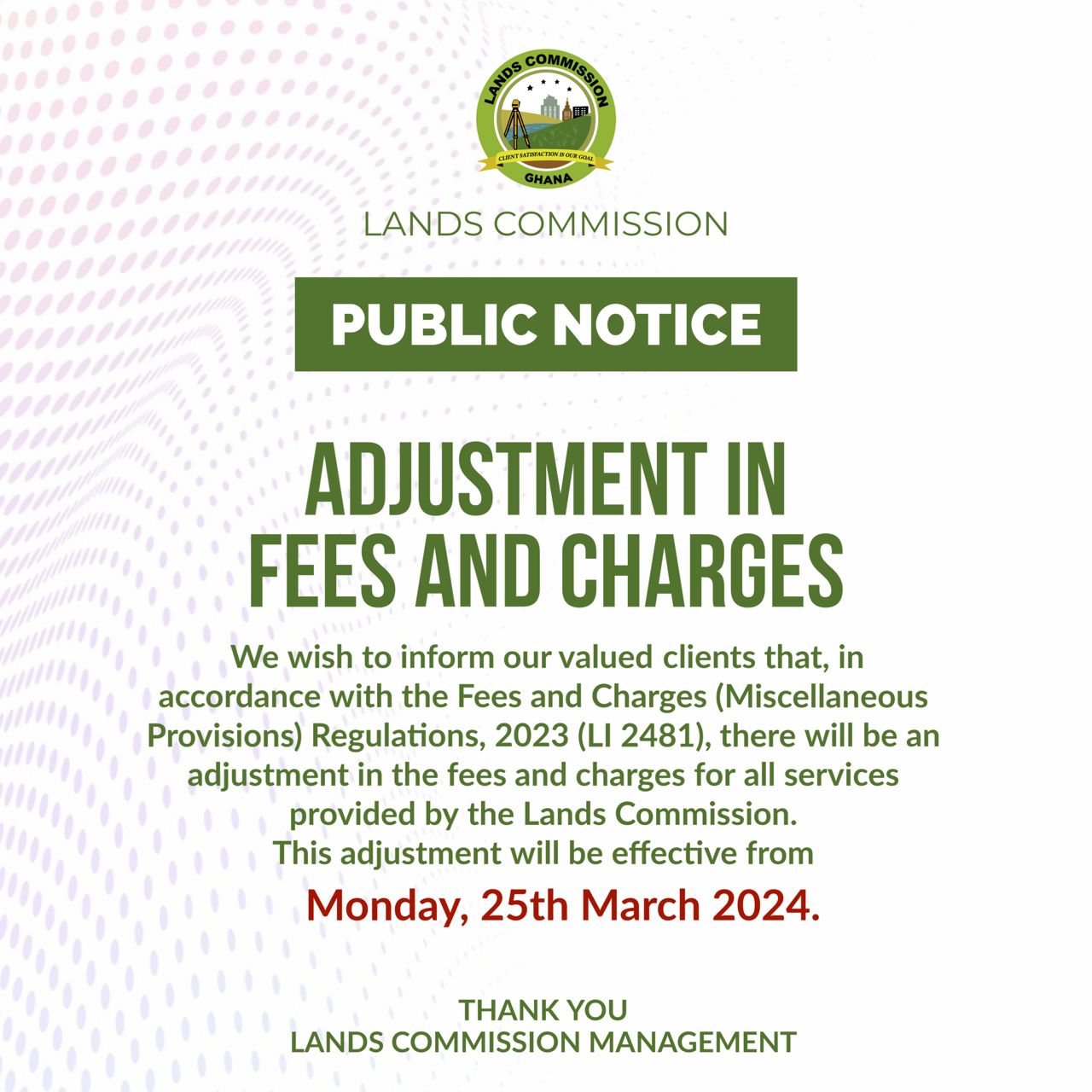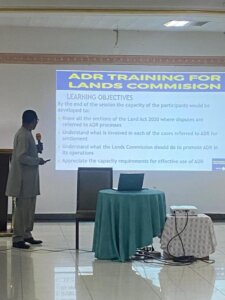 The Lands Commission has initiated a comprehensive Alternative Dispute Resolution (ADR) training workshop to equip its staff with advanced conflict resolution skills.
The Lands Commission has initiated a comprehensive Alternative Dispute Resolution (ADR) training workshop to equip its staff with advanced conflict resolution skills.
The workshop, held at Ange Hill Hotel, East Legon, is part of the Commission’s commitment to improving land dispute management in the wake of the Land Act, 2020 (Act 1036).
The Land Act mandates that parties involved in land disputes must exhaust all ADR procedures under the ADR Act, 2010 (Act 798), before turning to litigation in court.
It is against this backdrop that Management has put together rhis all important training to build rhe capacity of staff to be more professional in handling land disputes that use ADR mechanisms.
The day one of the training covered key areas such as:
The role of ADR in Lands Commission by Surv. Kofi Obeng -Ayirebi FGhIS, Effective Communication in ADR delivered by Surv. Cobbold, FGhIS, An overview of Ghana’s Alternative Dispute Resolution, Act 2010 (Act 798) by Surv.Patrick Sodja Botchway ESQ, FGhIS
Facilitated by experts from the Ghana Institution of Surveyors (GhIS), the workshop drew participants from different divisions of the Lands Commission.
The four-day training which commenced on Tuesday, October 1, 2024, is to provide practical knowledge in negotiation, mediation, and conflict resolution, essential for handling the Commission’s numerous land disputes.
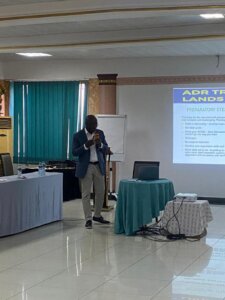 Surv. Dr. Anthony Arko-Adjei, President of GhIS, welcomed the participants, encouraging them to actively engage and understand the appropriate ADR mechanisms for various disputes. “The skills gained from this training will enable the Commission to offer improved service to the public, ensuring faster and more efficient land dispute management,” he stated.
Surv. Dr. Anthony Arko-Adjei, President of GhIS, welcomed the participants, encouraging them to actively engage and understand the appropriate ADR mechanisms for various disputes. “The skills gained from this training will enable the Commission to offer improved service to the public, ensuring faster and more efficient land dispute management,” he stated.
He further commended the management of the Commission for the opportunity to showcase their expertise in these related fields.
“The traditional courts are chocked with too many land dispute cases, hence, the urgent need to resort to ADR mechanisms for a faster and amicable resolution of these land disputes to ease the pressure on the courts” he noted.
He added that the Lands Commission handles huge volumes of applications that may be dispute related cases and has long integrated ADR into their conflict resolution processes to ensure smooth registration of interests and rights.
“The Land Act has come to empower the Commission to look at it more critically as it has the potential to reduce the long protracted never-ending land disputes in our courts,” he remarked.
Surv. Jones Ofori-Boadu, Deputy Executive Secretary in charge of Corporate Services, highlighted the significance of ADR in enhancing the Commission’s capacity to resolve land disputes. “This workshop is crucial for empowering our staff to manage disputes more efficiently. ADR offers a faster, cost-effective, and peaceful alternative to court proceedings,” he said.
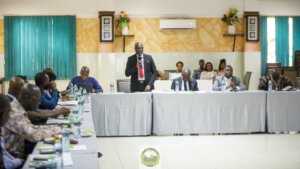 Surv. Ofori-Boadu emphasized that the training aligns with the institution’s mission of delivering efficient and effective land administration in Ghana.
Surv. Ofori-Boadu emphasized that the training aligns with the institution’s mission of delivering efficient and effective land administration in Ghana.
The initiative represents a significant step toward enhancing the Commission’s capabilities, offering quicker, less costly, and peaceful resolutions to land disputes, ultimately benefiting the public and promoting better land administration.
He revealed that the training would be replicated in other regions to ensure staff are well equipped with the requisite skills for this task.
Background
Alternative Dispute Resolution (ADR) mechanisms have proven to be invaluable tools in settling conflicts without the need for court litigation. The most common methods include mediation, arbitration, customary arbitration, negotiation, collaborative law, and adjudication. These methods provide quicker, cost-effective, and peaceful alternatives to resolving disputes.
Mediation, a key ADR method, involves a neutral third party helping the disputing parties reach a mutual agreement. Collaborative law, a variation of mediation, allows each party to retain their lawyer while agreeing to settle the dispute out of court.
Negotiation, another method, involves direct communication between the disputing parties, often leading to faster, amicable resolutions. In more complex cases, expert witnesses—specialists with in-depth knowledge—are called upon to offer insights that facilitate early dispute resolution.
Other specialized ADR methods, such as conciliation, expert determination, and reconciliation, also play essential roles in resolving disputes across various sectors, providing diverse solutions tailored to different conflict situations.
Day two of the training had insightful presentations on the following topics:
The requirements of ADR by the Land Act, 2020,Act 1036 by Surv. Dr.w.Odame-Larbi, FGhIS
Introduction to Negotiation by Surv. J.E.K Dadson, FGhIS (PP), Introduction to Mediation/Mediation Agreement –
Surv. Kofi Obeng-Ayirebi, FGhIS.
The training offers a platform for sharing real-life experiences, knowledge transfer, and acquisition and also a sense of bonding.
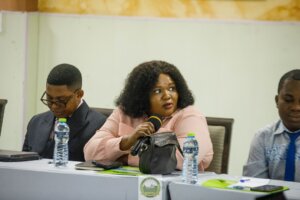
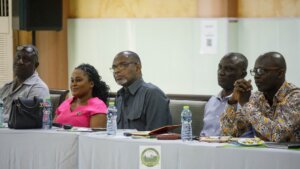
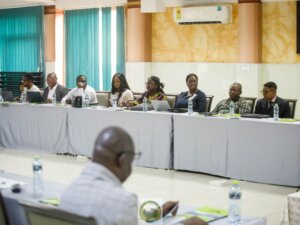
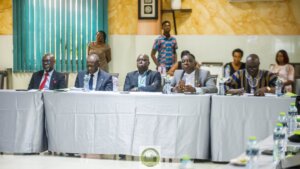
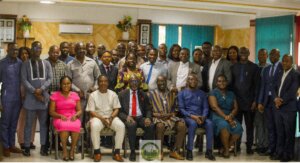
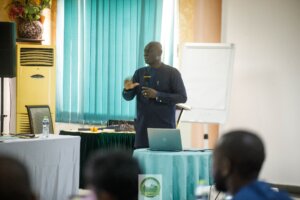
END
COMMS UPDATES


